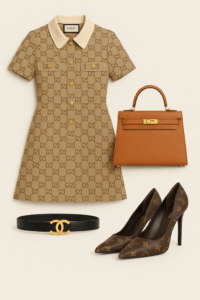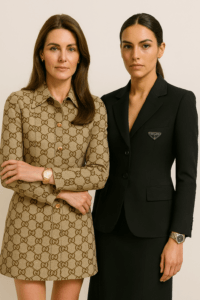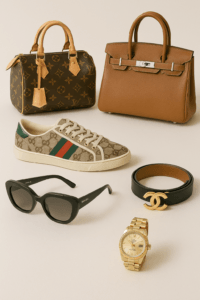
I often hear people speak of luxury fashion with a mix of reverence and desire. This fascination isn’t new; it’s been cultivated over centuries as luxury fashion has evolved to become a pillar of the industry. To understand this allure, you need to know what sets luxury brands apart: it’s their unparalleled quality, exquisite craftsmanship, and the story they tell through each piece.
Luxurance isn’t just a tag; it conveys a message, an ethos. It gives those who wear it a sense of exclusivity and status, elevating them above the ordinary. But have you ever wondered why we’re drawn to these brands? There are layers to that desire, ranging from the psychological satisfaction of owning something rare to the emotional connection we forge with the brand’s legacy.
A luxury fashion item isn’t just a purchase; it’s an investment in a piece of art that carries the heritage of the brand along with it. When I discuss the best luxury fashion brands, I focus on an array of factors—heritage, quality, design innovation, and the loyalty they command across generations.
The conversation about luxury fashion brands is incomplete without mentioning the pioneers that have stood the test of time. Their stories of resilience, innovation, and sophistication have set the standard for what we see as the pinnacle of the fashion world. Their influence is undeniable, setting them at the helm of the industry, guiding its future while staying true to their roots. Next, we’ll explore these trailblazers—the timeless luxury fashion houses that have become synonymous with elegance and style.
The Pioneers of Elegance: Timeless Luxury Fashion Houses

Some brands have become synonymous with luxury, their names etched into the history of fashion. These brands have stood the test of time by maintaining an unwavering commitment to elegance and quality. Among them, Chanel, Louis Vuitton, and Hermes stand out as the patriarchs of high fashion. Let’s get to know them better.
Coco Chanel once said, ‘Fashion changes, but style endures.’ True to her words, Chanel has reigned over the fashion world with its classic style characterized by chic simplicity and profound femininity. It’s a label that has become a cultural icon, one often seen gracing the red carpets and high societies across the globe.
On to Louis Vuitton, a brand that started with the crafting of exquisite trunks. Today, it’s a symbol of sophistication that seamlessly blends traditional craftsmanship with modernity. The LV monogram is recognized worldwide, a testament to the brand’s legacy in leading the way for innovative design while staying true to its heritage.
Finally, there’s Hermes, the epitome of craftsmanship and exclusivity. Known for its meticulous attention to detail and use of fine materials, it’s a brand where quantity never overshadows quality. From hand-stitched leather goods to the coveted Birkin bag, owning a piece of Hermes is like holding a fragment of art that carries centuries of artisan tradition.
These icons have set unparalleled standards in the fashion industry, influencing not just style, but a way of being that’s aspirational. They remind us that true luxury is timeless, transcending ephemeral trends and always remaining in vogue.
These foundational giants, with their distinctive identities, have paved the way for a new generation of luxury fashion leaders. Brands like Gucci and Prada, which we’ll explore in the next section, have taken the baton to redefine luxury, pairing traditional elegance with the pulse of contemporary culture.
Modern Icons: Contemporary Leaders in Luxury Fashion

In a world where fashion trends seem to shift with the wind, certain brands have anchored themselves as contemporary icons. These brands, with their bold designs and innovative approaches, are carving out new legacies within the luxury market.
Take Gucci, for example. Once a staid brand associated with conservative, old-world luxury, it’s undergone a dramatic transformation. Now, Gucci stands at the forefront of high fashion, showcasing pieces that blend historical references with a strikingly modern aesthetic. It’s luxury with an edge, appealing to younger consumers who crave a narrative of rebellion spiced with sophistication.
Prada, on the other hand, walks the line between avant-garde innovation and timeless luxury. Its designs consistently push the envelope, inviting fashion enthusiasts to think beyond the conventional boundaries of luxury. With Prada, it’s clear: fashion isn’t just about what you wear; it’s a statement of personal philosophy.
And then there’s Rolex, the name that commands instant recognition in luxury timekeeping. More than just watches, Rolex creates heirlooms that are symbols of achievement and craftsmanship. They resonate with a notion of luxury that goes beyond the passing whims of fashion, anchoring their appeal in quality that endures.
These brands not only command attention for their design and quality but also set the stage for the next pivotal trend in the luxury sector: sustainability and ethics. They play a crucial part in inspiring and realizing the change that luxury fashion is experiencing today.
The Future of Luxury: Embracing Sustainability and Ethics

As I wrap up our exploration of luxury fashion brands, it’s essential to acknowledge a transformative shift within the industry: the pivot towards sustainability and ethical standards. Luxury is no longer defined solely by opulence and exclusivity. Today, brands that also demonstrate a commitment to social and environmental responsibility capture the modern consumer’s heart.
The shift is not a fleeting trend but a robust movement backed by consumer awareness and progressive brand strategies. Brands like Stella McCartney have been pioneers, embedding sustainability into their DNA from the outset. Others, such as Gucci and Prada, are adapting, setting ambitious goals to reduce their environmental impact and improve supply chain transparency.
This integration of ethics has given rise to exciting innovations in materials and processes that challenge traditional definitions of luxury. For example, lab-grown diamonds and leather alternatives are gaining prestige as sustainable and ethical status symbols.
Consumers play a pivotal role in this shift. Their discoveries and choices empower brands to make significant strides in sustainability. By supporting those that align with their values, consumers push the entire industry toward a brighter, more responsible future.
In conclusion, the best luxury fashion brands are those that successfully merge timeless elegance with contemporary values. They evolve, innovate, and lead with not just style, but substance, integrity, and an unyielding commitment to a better world.
